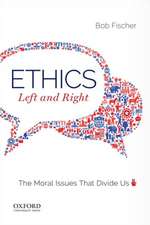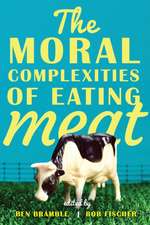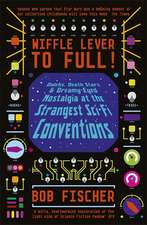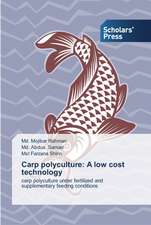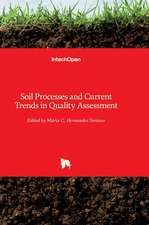Animal Ethics: A Contemporary Introduction: Routledge Contemporary Introductions to Philosophy
Autor Bob Fischeren Limba Engleză Paperback – 6 mai 2021
There are many introductions to the animal ethics literature. There aren't many introductions to the practice of doing animal ethics. Bob Fischer's Animal Ethics: A Contemporary Introduction fills that gap, offering an accessible model of how animal ethics can be done today. The book takes up classic issues, such as the ethics of eating meat and experimenting on animals, but tackles them in an empirically informed and nuanced way. It also covers a range of relatively neglected issues in animal ethics, such as the possibility of insect sentience and the ethics of dealing with pests. Finally, the book doesn't assess every current practice using standard ethical theories, but tries to evaluate some of them using the moral frameworks endorsed by those involved. So, for instance, there is a chapter on the way that animal care and use committees try to justify some of the educational uses of animals, and the chapter on zoos considers the way that international zoological societies justify compromising animal welfare. The book wraps up with a discussion of the future of animal ethics. Each chapter opens with a helpful initial overview of the chapter and ends with a list of suggested readings to help students go further on their own.
Key Features
- Covers animal ethics from an empirically informed perspective, bringing philosophy into conversation with key issues in animal science, conservation biology, economics, ethology, and legal studies, among other fields
- Provides ample coverage of the most salient current topics, including, for example:
- Debates about which animals are sentient
- The suffering of wild animals
- Research ethics
- The boundaries of activism
- Avoids suggesting that animal ethics is simply the practice of applying the right general theory to a problem, instead allowing readers to first work out the specific costs and benefits of making ethical decisions
- Impresses upon the reader the need for her to work out for herself the best way forward with difficult ethical issues, suggesting that progress can indeed be made
- Includes summaries and recommended readings at the end of each chapter
| Toate formatele și edițiile | Preț | Express |
|---|---|---|
| Paperback (1) | 280.28 lei 3-5 săpt. | +19.00 lei 7-13 zile |
| Taylor & Francis – 6 mai 2021 | 280.28 lei 3-5 săpt. | +19.00 lei 7-13 zile |
| Hardback (1) | 1021.04 lei 6-8 săpt. | |
| Taylor & Francis – 6 mai 2021 | 1021.04 lei 6-8 săpt. |
Din seria Routledge Contemporary Introductions to Philosophy
-
 Preț: 311.90 lei
Preț: 311.90 lei -
 Preț: 316.33 lei
Preț: 316.33 lei -
 Preț: 296.58 lei
Preț: 296.58 lei -
 Preț: 265.28 lei
Preț: 265.28 lei -
 Preț: 287.79 lei
Preț: 287.79 lei -
 Preț: 295.29 lei
Preț: 295.29 lei -
 Preț: 302.64 lei
Preț: 302.64 lei -
 Preț: 295.63 lei
Preț: 295.63 lei -
 Preț: 311.47 lei
Preț: 311.47 lei -
 Preț: 265.87 lei
Preț: 265.87 lei -
 Preț: 268.17 lei
Preț: 268.17 lei -
 Preț: 310.22 lei
Preț: 310.22 lei -
 Preț: 356.94 lei
Preț: 356.94 lei - 20%
 Preț: 239.80 lei
Preț: 239.80 lei -
 Preț: 342.06 lei
Preț: 342.06 lei -
 Preț: 286.87 lei
Preț: 286.87 lei -
 Preț: 281.18 lei
Preț: 281.18 lei -
 Preț: 372.91 lei
Preț: 372.91 lei -
 Preț: 334.58 lei
Preț: 334.58 lei -
 Preț: 293.52 lei
Preț: 293.52 lei -
 Preț: 280.92 lei
Preț: 280.92 lei - 9%
 Preț: 936.25 lei
Preț: 936.25 lei -
 Preț: 350.02 lei
Preț: 350.02 lei -
 Preț: 231.05 lei
Preț: 231.05 lei -
 Preț: 388.42 lei
Preț: 388.42 lei -
 Preț: 281.42 lei
Preț: 281.42 lei -
 Preț: 375.33 lei
Preț: 375.33 lei -
 Preț: 386.00 lei
Preț: 386.00 lei -
 Preț: 346.33 lei
Preț: 346.33 lei -
 Preț: 366.80 lei
Preț: 366.80 lei
Preț: 280.28 lei
Nou
53.63€ • 55.89$ • 44.41£
Carte disponibilă
Livrare economică 13-27 martie
Livrare express 27 februarie-05 martie pentru 28.99 lei
Specificații
ISBN-10: 1138484431
Pagini: 262
Dimensiuni: 152 x 229 x 20 mm
Greutate: 0.36 kg
Ediția:1
Editura: Taylor & Francis
Colecția Routledge
Seria Routledge Contemporary Introductions to Philosophy
Locul publicării:Oxford, United Kingdom
Public țintă
UndergraduateCuprins
Notă biografică
Recenzii
Clare Palmer, Texas A&M University
"This is an excellent introduction to animal ethics, both its various moral frameworks and the range of issues related to nonhuman animals. Its nuanced exploration of animal ethics is written in a style that is simultaneously accessible and engaging to newcomers to this topic and insightful and productively provocative for readers with extensive experience thinking about these issues. From a teaching perspective, this introduction makes many valuable observations and raises important questions for thinking about how to approach these topics. It is both a fantastic introduction and a valuable tool for prompting deeper discussions in more advanced courses."
Elan Abrell, New York University
Descriere
There are many introductions to the animal ethics literature. There aren't many introductions to the practice of doing animal ethics. Bob Fischer's Animal Ethics: A Contemporary Introduction fills that gap, offering an accessible model of how animal ethics can be done today. The book takes up classic issues, such as the ethics of eating meat and experimenting on animals, but tackles them in an empirically informed and nuanced way. It also covers a range of relatively neglected issues in animal ethics, such as the possibility of insect sentience and the ethics of dealing with pests. Finally, the book doesn't assess every current practice using standard ethical theories, but tries to evaluate some of them using the moral frameworks endorsed by those involved. So, for instance, there is a chapter on the way that animal care and use committees try to justify some of the educational uses of animals, and the chapter on zoos considers the way that international zoological societies justify compromising animal welfare. The book wraps up with a discussion of the future of animal ethics. Each chapter opens with a helpful initial overview of the chapter and ends with a list of suggested readings to help students go further on their own.
Key Features
- Covers animal ethics from an empirically informed perspective, bringing philosophy into conversation with key issues in animal science, conservation biology, economics, ethology, and legal studies, among other fields
- Provides ample coverage of the most salient current topics, including, for example:
- Debates about which animals are sentient
- The suffering of wild animals
- Research ethics
- The boundaries of activism
- Avoids suggesting that animal ethics is simply the practice of applying the right general theory to a problem, instead allowing readers to first work out the specific costs and benefits of making ethical decisions
- Impresses upon the reader the need for her to work out for herself the best way forward with difficult ethical issues, suggesting that progress can indeed be made
- Includes summaries and recommended readings at the end of each chapter

